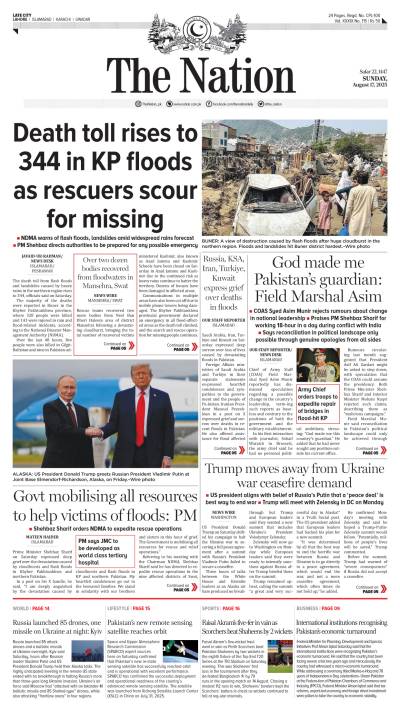LAHORE - Punjab Chief Minister Maryam Nawaz Sharif on Wednesday laid the foundation stone of Pakistan’s first-ever Environment Protection Force, a multi-tiered, specialized unit aimed at addressing pollution and climate hazards across the province. The force — a pioneering initiative in the country — comprises several specialized squads tasked with addressing distinct environmental challenges. Speaking at the passing out parade of the first batch, the chief minister lauded the initiative as a “revolutionary milestone” in environmental governance. “This is a moment of pride for Punjab and for Pakistan. For the first time, we are not just talking about protecting the environment — we are taking bold, tangible action,” the chief minister said, after personally interacting with and encouraging the newly recruited members of the force.
Specialized Environmental Squads
Red Squad: Deployed to monitor hazardous substances in industrial zones and hospitals. Hawk Eye Squad: Equipped with 360-degree live camera vehicles and 11 thermal drones capable of nighttime surveillance to ensure round-the-clock environmental vigilance. Urban Patrolling & Vigilance Squad: Tasked with preventing urban environmental hazards, particularly in high-density areas. Brick Kiln Squad: Will operate using eight specialized double-cabin vehicles to regulate emissions from brick kilns — a major source of smog and air pollution. Anti-Plastic and Dust Squad: Focused on plastic eradication and dust pollution control across cities. Point Source Pollution Monitoring Squad: Dedicated to identifying and monitoring direct sources of environmental pollution. Mobile Air Quality Monitoring Station: A mobile unit will continuously monitor air quality and help enforce environmental compliance. The chief minister also inaugurated two major technological systems: The Environmental Approval Management System (EMS) to fast-track and regulate environmental clearances. The Vehicle Emission Testing System (ETS), marking a new era of eco-regulation for transport. Maryam Nawaz herself underwent the ETS procedure and personally affixed the first emission-compliant sticker to her official vehicle, symbolizing the government’s commitment to lead by example. Senior Minister Marriyum Aurangzeb provided an in-depth briefing on the scope of the initiative, highlighting several other squads under the Environment Protection Force: E-Bike Squad: A green mobility unit using eco-friendly electric bikes. Green Squad: Focused on anti-plastic efforts, dust control, and dengue prevention in urban centres. Blue Squad: Mandated to protect Punjab’s water bodies and prevent contamination. Black Squad: Dedicated to monitoring vehicle fuel quality and curbing toxic emissions. To commemorate the launch, Chief Minister Maryam Nawaz hoisted the official flag of the Environment Protection Authority, marking a symbolic new beginning in Punjab’s battle against climate change and pollution.
This all-encompassing force, coupled with cutting-edge monitoring systems, positions Punjab as a national leader in environmental innovation and signals a shift towards sustainable development in Pakistan.
Addressing the passing out ceremony for the newly trained recruits, the chief minister commended the diverse team, highlighting the participation of Sikh women in the initiative. “Wearing this uniform means protecting the nation’s environmental borders, a huge responsibility,” she remarked.
The chief minister also reflected on the Punjab government’s recent efforts, stating that millions of trees had been planted to make the province greener, while acknowledging the poor environmental conditions left by the previous government. She credited the current leadership for turning the country around, pointing to economic achievements such as a dramatic reduction in inflation and a sharp decline in food prices. For example, the price of roti has fallen from Rs 25 to Rs 12, ensuring fewer people go hungry.
Maryam Nawaz emphasized that the government was committed to tackling climate change by implementing a comprehensive environmental policy. She pointed to successful initiatives, including a zero-plastic policy now being adopted by other provinces. The Environment Protection Force, with its specialized squads, was a key part of this strategy. The force will focus on combating air pollution, smog, and other environmental hazards.
She also highlighted the government’s efforts to improve public services, including the provision of free medicines in hospitals, free surgeries for children, and dialysis services. Her administration has also introduced reforms to ensure accountability in healthcare, with a zero-tolerance policy for negligence in hospitals.
On education, the chief minister announced improvements through the outsourcing of schools, scholarships, and the distribution of laptops. Additionally, the government’s ‘Apni Chhat, Apna Ghar’ program has supported thousands in securing homes, and the introduction of electric buses in Lahore marks a significant step towards greener transportation across Punjab.
Maryam Nawaz concluded by reaffirming the government’s commitment to advancing the country’s progress, noting that with five more years of stable governance, Pakistan would continue its rapid development.








